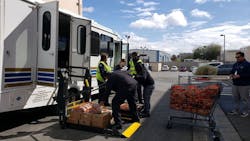Transit agencies help deliver food to riders at risk during pandemic
Food, by all definitions, is considered essential, but for some populations, such as seniors or others with underlying health or mobility issues, going to the grocery store can carry added risk amid a spreading pandemic.
Many transit providers in states such as Nevada, Texas, Iowa, Minnesota and Michigan are working with local partners to ensure food is delivered to those who need it.
The Capital Metropolitan Transportation Authority (Cap Metro) in Austin, Texas, is working with H-E-B and the Central Texas Food Bank to provide Help-at-Home Kits to Cap Metro’s MetroAccess clients free of charge. The kits will include shelf-stable items, such as vegetables, beans, soup, fruit, tuna and peanut butter, delivered to a customer's doorstep using the authority’s MetroAccess vehicles.
“Our MetroAccess service provides transportation for clients whose disabilities or medical conditions prevent them from using public transit. Many of them are in fragile health, and it's important they are able to stay at home to protect their health and safety, and not worry about how they will get basic necessities,” Cap Metro explained.
The Regional Transportation Commission (RTC) of Southern Nevada is working with Three Square to ensure seniors will still have access to food through deliveries. Nevada is currently under a 30-day non-essential business shutdown and the reduction in demand has freed RTC paratransit vehicles to provide food deliveries.
Smaller transit providers are also filling where they are needed, such as in Linn County, Iowa, where LIFTS is transporting food throughout the county to combat food insecurity. As Mass Transit previously reported, Livingston Essential Transportation Service (LETS) in Livingston County, Mich., is working with community organizations, such as Meals on Wheels and local food pantries, to ensure meals are being delivered.
In Minnesota, customers who usually book rides through the paratransit service Metro Mobility can now book “rides for supplies.” Metro Mobility customers can order groceries and other household essentials online and have a certified Metro Mobility driver pick the order up and deliver it for free.
About the Author

Mischa Wanek-Libman
Group Editorial Director
Mischa Wanek-Libman is director of communications with Transdev North America. She has more than 20 years of experience working in the transportation industry covering construction projects, engineering challenges, transit and rail operations and best practices.
Wanek-Libman has held top editorial positions at freight rail and public transportation business-to-business publications including as editor-in-chief and editorial director of Mass Transit from 2018-2024. She has been recognized for editorial excellence through her individual work, as well as for collaborative content.
She is an active member of the American Public Transportation Association's Marketing and Communications Committee and served 14 years as a Board Observer on the National Railroad Construction and Maintenance Association (NRC) Board of Directors.
She is a graduate of Drake University in Des Moines, Iowa, where she earned a Bachelor of Arts degree in Journalism and Mass Communication.
